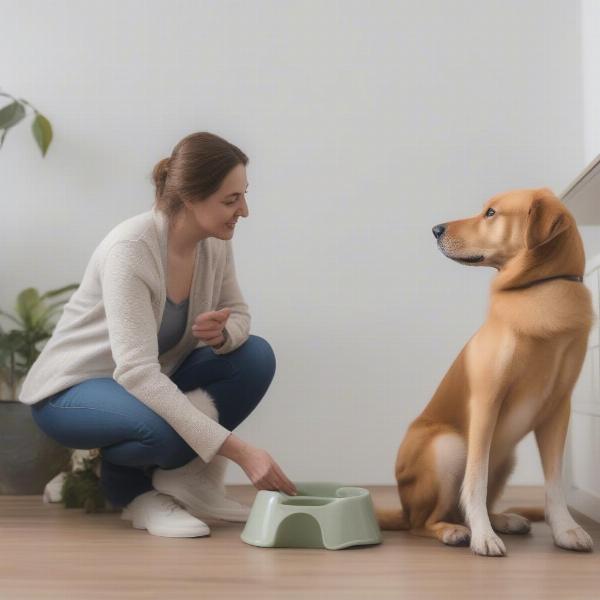House training a dog can be a challenging journey, and sometimes, even after apparent success, you might encounter a setback. This is known as dog potty training regression, where a previously house-trained dog starts having accidents indoors again. Understanding the reasons behind this regression is crucial for effectively addressing the issue and getting your furry friend back on track.
Why is My Dog Suddenly Having Accidents?
Several factors can contribute to potty training regression in dogs. It’s important to identify the underlying cause to implement the right solution. Is it a medical issue, a behavioral change, or perhaps a shift in their environment? Let’s delve into some common culprits.
Medical Reasons for Regression
Underlying medical conditions can often manifest as changes in potty habits. Urinary tract infections, diabetes, and even cognitive decline in older dogs can lead to increased urgency and inability to control their bladder or bowels. If your dog exhibits other symptoms like increased thirst, lethargy, or changes in appetite, a visit to the vet is crucial.
Behavioral Causes of Regression
Sometimes, potty training regression stems from behavioral issues. Stressful events like moving to a new home, the introduction of a new pet or family member, or even changes in routine can disrupt a dog’s learned habits. Anxiety and fear can also contribute to accidents.
Environmental Factors
Changes in your dog’s environment can also trigger regression. A new cleaner with a strong scent might confuse your dog, making them think it’s an appropriate place to eliminate. Similarly, if access to their usual potty spot is restricted, they might resort to going indoors.
How to Address Potty Training Regression
Once you’ve identified the potential cause, you can start addressing the regression. Remember, patience and consistency are key. It’s essential to avoid punishment, as this can worsen anxiety and exacerbate the problem.
Retraining Your Dog
Going back to the basics is often the most effective approach. Re-establish a consistent potty schedule, taking your dog out frequently, especially after waking up, eating, and playing. Reward successful potty breaks with praise and treats. Supervise your dog closely indoors, and if you catch them in the act of having an accident, interrupt them calmly and take them outside.
Managing Stress and Anxiety
If stress or anxiety is the culprit, creating a calm and predictable environment is essential. Provide your dog with a safe space, offer comforting toys, and consider using pheromone diffusers or calming supplements. Consult with a veterinarian or a certified dog trainer for guidance on managing anxiety.
Cleaning Up Accidents Effectively
Thoroughly cleaning any accident areas is crucial to eliminate lingering odors that might encourage repeat offenses. Use an enzymatic cleaner specifically designed for pet messes, as these break down the odor-causing molecules effectively.
What if the Regression Persists?
If the regression persists despite your efforts, it’s crucial to consult with a veterinarian or a certified professional dog trainer. They can help rule out any underlying medical conditions, assess your dog’s behavior, and provide tailored guidance for addressing the specific challenges you’re facing.
 Consulting a Dog Trainer
Consulting a Dog Trainer
Conclusion
Dog potty training regression can be frustrating, but it’s important to remember that it’s often a temporary setback. By understanding the underlying causes and implementing the right strategies, you can help your furry friend regain their house-training skills and enjoy a happy, accident-free home. Patience, consistency, and a positive approach are key to success.
FAQ
-
How long does potty training regression typically last? The duration of regression varies depending on the underlying cause and the dog’s individual response to retraining. It can last from a few days to several weeks.
-
Is it normal for older dogs to have accidents? While age-related changes can contribute to incontinence, it’s essential to rule out any underlying medical conditions before assuming it’s a normal part of aging.
-
Should I punish my dog for having accidents indoors? Punishment is never recommended, as it can worsen anxiety and create fear or distrust. Focus on positive reinforcement and retraining techniques.
-
Can changes in diet affect potty training? Yes, dietary changes can sometimes lead to digestive upset, which can affect a dog’s ability to control their bowel movements.
-
When should I seek professional help for potty training regression? If the regression persists despite your efforts or if you suspect a medical issue, consulting with a veterinarian or a certified dog trainer is recommended.
-
What are the best cleaning products for dog accidents? Enzymatic cleaners specifically designed for pet messes are the most effective at eliminating odors and discouraging repeat accidents.
-
Can medications help with potty training regression? In some cases, medications might be necessary to address underlying medical conditions or manage anxiety. Consult with your veterinarian for guidance.
ILM Dog is a leading international dog care website dedicated to providing expert advice and resources for dog owners worldwide. We offer comprehensive information on dog breeds, health, training, nutrition, grooming, and much more. Whether you’re a seasoned dog owner or just starting your journey, ILM Dog is your trusted source for all things dog-related. For personalized advice or further assistance, contact us at [email protected] or +44 20-3965-8624. Visit ILM Dog for more valuable insights and resources.